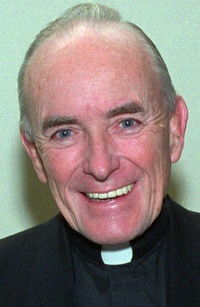â¨CHICAGO —The Rev. Andrew Greeley was, it seems, always writing. At home on a typewriter, later on a computer, then on a plane with a laptop and even in his car dictating into a tape recorder as he drove.
By the time he finished, the outspoken Roman Catholic priest and Chicago newspaper columnist had written more than 100 nonfiction books and some 50 novels, many international mystery thrillers that routinely climbed onto best-seller lists. They were translated into a dozen languages.
And he also often spoke out about various religious topics, even criticizing the hierarchy of his own church over the child sex-abuse scandal.
“His mind was never idle,” said Tom Smith, Greeley’s longtime colleague at the University of Chicago, where Greeley spent years as a sociology researcher.
“He was the kind of person who could be writing a column and get an idea for a novel, have a conversation he would use in a novel, use his novels to inspire his academic work and his academic work to inspire his novels,” Smith said Thursday, shortly after learning about his friend’s death.
On Wednesday night, nearly five years after he suffered a brain injury during a fall that put him in a coma for weeks, Greeley died in his home in downtown Chicago. He was 85.
“He served the church all those years with a prophetic voice and with unfailing dedication,” his niece, Elizabeth Durkin, said in a statement. She also praised Greeley as a loving uncle who “tremendously enriched” his family’s lives.
Greeley, who was ordained in 1954, wrote a weekly column that appeared in the Chicago Sun-Times and other newspapers on the relationship between religion and politics. An internationally recognized scholar, he also was a contributor to the New York Times, National Catholic Reporter and other publications.
His final book, “Chicago Catholics and the Struggles Within Their Church,” was published in 2010, exploring a topic that he had written about for years, sometimes giving him a reputation for generating controversy in the church.
“Sometimes I think that we as priests and bishops have done everything we possibly could to drive away the laity during the last 20 years,” Greeley wrote in his book “Catholic Contributions: Sociology and Policy,” published in 1987.
Greeley also had said that neither the church nor the government was willing to do much about priests who sexually abused children, telling a lay Catholic group in 1992: “The sexually maladjusted priest has been able to abuse the children of the laity and thus far be reasonably secure from punishment.”
And during a news conference in 1987, Greeley said that if he were heading a church fundraising campaign, he would admit to church members that “we’ve really goofed. People are resentful over what they take to be the insensitivity of church leaders — particularly on matters relating to sex.”
Greeley was born in the Chicago suburb of Oak Park in 1928, and he spent much of his life close to home. He worked as a sociology professor at the University of Arizona and a researcher at the University of Chicago’s NORC, formerly known as the National Opinion Research Center. He earned post-graduate degrees from the University of Chicago in the 1960s.
The priest became often quoted and interviewed in the media. In a biography published on his website, Greeley described himself as having “unflinchingly urged his beloved church to become more responsive to evolving concerns of Catholics everywhere.”
The same biography noted he was a Chicago sports fan and cheered for the Bulls, Bears and the Cubs, “while praying for them to improve.”
In 1986, Greeley offered the Archdiocese of Chicago $1 million to create a foundation to help inner-city Catholic students. The archdiocese refused the money but wouldn’t say why.
So Greeley set up his own Catholic Inner-City School Fund to distribute money to the 80 Catholic schools in the city with student enrollments that are more than 50 percent black or Hispanic.
Send questions/comments to the editors.



Success. Please wait for the page to reload. If the page does not reload within 5 seconds, please refresh the page.
Enter your email and password to access comments.
Hi, to comment on stories you must . This profile is in addition to your subscription and website login.
Already have a commenting profile? .
Invalid username/password.
Please check your email to confirm and complete your registration.
Only subscribers are eligible to post comments. Please subscribe or login first for digital access. Here’s why.
Use the form below to reset your password. When you've submitted your account email, we will send an email with a reset code.